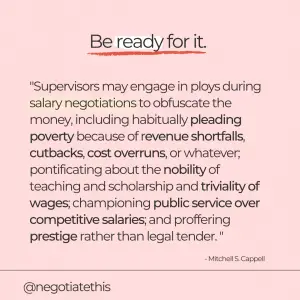Here are 5 easy steps if your boss tells you there aren’t any funds left. This is an all too common response for when you are asking for what you rightfully deserve. Has this happened to you? It’s happened to me. Multiple times. The first time I was tricked. The next time, I knew better. Here are some tips I learned so that you know better too.

- Give wait time
- Mirror what your boss says
- Restate the market value and how your value compares (and exceeds it)
- Tell them you have to think about it
- Be ready to walk away
- More
Keep in mind that the response that there aren’t any funds left is not new or original.
“Employees’ raises are employers’ costs. Your supervisor is judged unfavorably when evaluated for his salary raise if he excessively increases your salary. Supervisors may engage in ploys during salary negotiations to obfuscate the money, including habitually pleading poverty because of revenue shortfalls, cutbacks, cost overruns, or whatever; pontificating about the nobility of teaching and scholarship and triviality of wages; championing public service over competitive salaries; and proffering prestige rather than legal tender” (Cappell, 2012).
Since we know that this IS a thing (which is not acceptable… but we know that it’s out there), PLAN for this to happen. When your boss tells you there aren’t any funds left (which they most likely will), plan your response.
Whether the funds are there or not, be prepared.
Follow these steps when you are asking for more and your boss/superior/manager tells you there aren’t any funds left:

Step 1: Give wait time
After they tell you “there aren’t any funds left” in whatever phrasing they use, stay silent. Give it a beat. Sit in the uncomfortableness. DO NOT speak first (if you can help it). Let them explain. Make them explain through your silence. Oftentimes, people will get flustered by silence. Maybe your boss will try to fill the silence with an explanation (either false or valid), or they may say they will look into it, like mine did.
Step 2: Mirror what your boss says
Chris Voss @thefbinegotiator, famous hostage negotiator, tells his students to mirror their negotiation collaborator (your boss in this situation). If your boss says, “There aren’t any funds left to give you a raise.” You mirror what they say and reply in the format of a question: “There aren’t any funds left to give me a raise?” Then wait and let them reply. A key ingredient to “win” a negotiation is to let the other person talk more.
Continue mirroring (in an authentic way) by repeating what they said, “I understand the budget is tight right now because of XYZ. I’m sure you understand where I’m coming from and how my project increased revenue by Z amount. I think this increase is applicable for the value I provide”. Cater it to a version that works for you.
Step 3: Restate the market value and how your value compares (and exceeds it)
Data is your friend. Have *so much* research and data on the market value as well as your own value. Back up your asking price with all your amazing work achievements and examples (make sure you have that ready).

Step 4: Tell them you have to think about it
It’s okay to leave the meeting unresolved. If they won’t budge, say okay, you’ll have to think about it. Don’t leave the meeting letting them know that not meeting your standard is okay. Let them figure it out. This is not a YOU problem, it’s a THEM problem. Let THEM figure out where they will get the funds to pay you appropriately (in many cases, they somehow just magically turn up). During these times, they sometimes come back and meet your offer or get closer to it. It can also give you time to decide to negotiate a different item.
Step 5: Be ready to walk away
If they can’t figure this out (and especially if their business/organization really is doing that poorly and it wasn’t a cheap fib), then start looking, applying, etc.
This part is easier said than done, but it’s worth the effort you put in. It takes work to have another job lined up, have the funds to support yourself, etc.but start working towards that so you have options. Options are powerful.

More to it…
There’s more to it and nuance than just a simple step by step process… read on.
Negotiate Another Item
Another possible option is to negotiate another item you may want (more vacation time, furthering your education, other benefits, etc.). It’s not the same as that cash… I know. Sometimes it can be worth it, sometimes not. You make the call.
Always Market Yourself
Even if you love your job, always be looking/ thinking about how to remarket yourself. You can do it. You are AMAZING. Get creative.
Assess Company’s Financial Situation
Before the negotiation, it can be good practice to assess your company’s unique financial situation as best as you can.
Here are some questions that can help indicate a company’s financial health:
- Is the company hiring right now?
- Is the company on a hiring freeze?
- Are my coworkers furloughed?
- Have colleagues recently been laid off?
- Have I recently received recognition?
- Is the company financially stable?
Check out the blog post: Should I Negotiate Right Now? for more on this topic.
If now truly does not seem like the right moment for an increase, know that you have other options. You can ask for other items beyond monetary increases (for now). Get creative. If you can imagine it, you can probably ask for it. Also, asking for a pay increase or another form of an increase plants the seed in your superior’s mind of what path you are on and that you know what you are worth.
If now is not a good time to ask, when is? If a company cannot figure out how to pay you appropriately and if their business/organization really is doing that poorly (and it wasn’t just a cheap fib), then start looking and applying and FAST!

Sources:
- Cappell, M. (2012). The art of salary negotiation in academic medicine: Lessons from a 32-year career. American Society for Gastrointestinal Endoscopy, 75(4), 857-860. Published by Mosby, Inc.
- Chris Voss’s MasterClass: The Art of Negotiation.
Want More on Negotiation?
If you want weekly motivation and negotiation tips, sign up for blog posts and for daily inspiration follow @negotiatethis on Instagram. You got this. All you need is a little negotiation inspiration!
Want more negotiation tips? Check out these posts to help you in your next negotiation:
- 4 Reasons You Need to Track Your Work Wins and How They Help You Do Better in a Negotiation
- What Are Your Salary Expectations? How to Best Answer
- 7 Steps to Take When You Find Out You’re Underpaid
- What Are the Best and Worst Methods for Negotiating?
- Top 5 Negotiation Tips for a Smoother Negotiation
- 3 Powerful Negotiation Tips No One Tells You
- 3 Easy Steps to Promote Yourself in a Negotiation
- 4 Important Questions You Need Answered Before Your Negotiation
- 3 Tips: Find the Numbers to Emphasize Your Valuable Contributions
- 6 Important Items to Think About When Asking for More
- When You Negotiate Make Sure You Complete These 8 Items
Disclaimer: While the contents of this post and blog come from research and personal experience, each experience, situation and/or person has their own unique circumstances. This is not negotiation, financial or any other form of legitimate or official advice from an expert. Each individual should do their own independent, comprehensive research. Negotiation, career and all other decisions are the sole responsibility of each individual or party. Details found on the blog and in individual posts are opinions and should be treated as such for entertainment purposes only. Read further disclaimer information in the footer and on the Disclaimer page.
